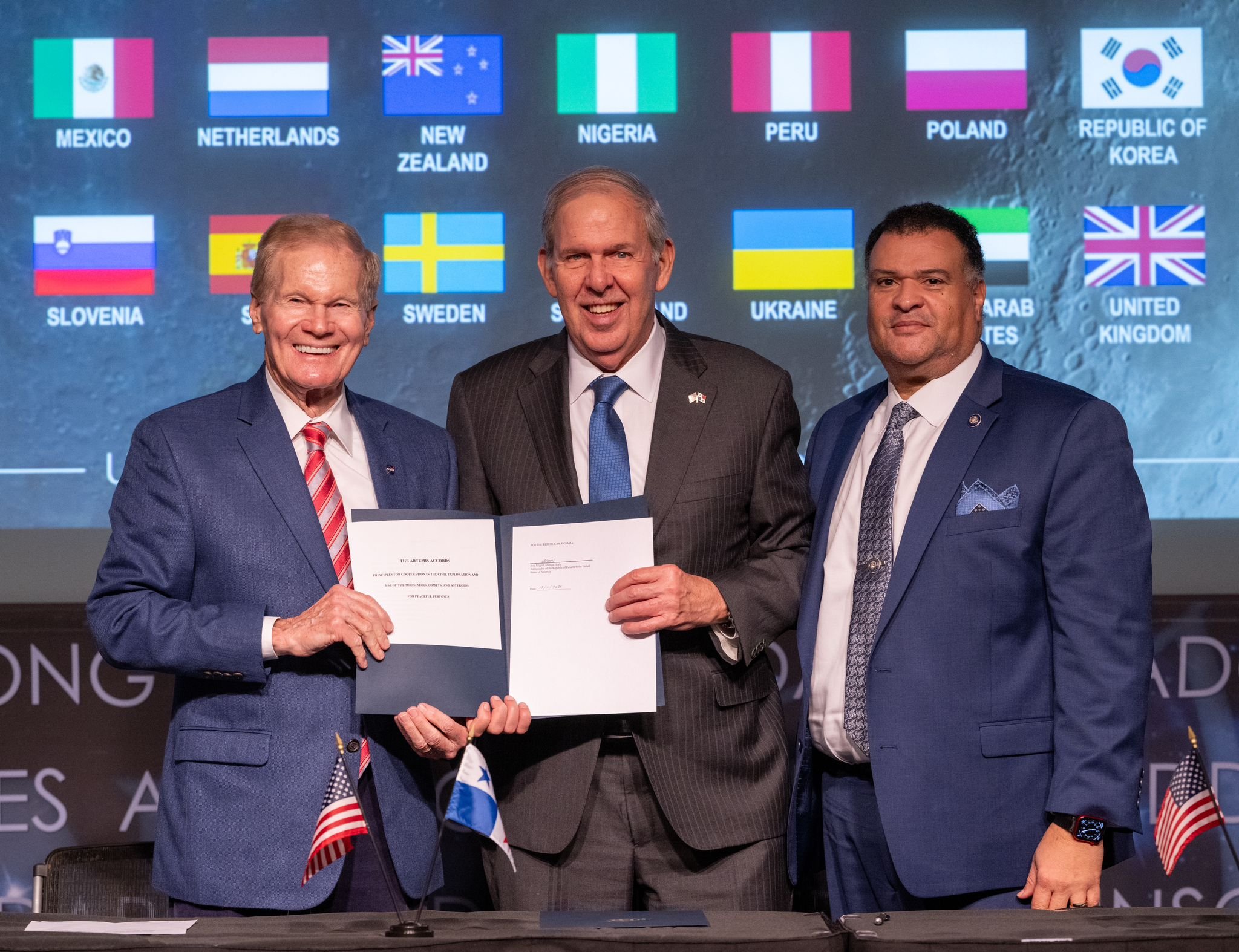Panama Joins the Artemis Accords with NASA
Bill Nelson, NASA’s Administrator. José Miguel Alemán, Ambassador of Panama to the U. S. Tony Fernandes, Principal Deputy Assistant Secretary Department of State’s Bureau of Oceans and International Environmental and Scientific Affairs.
Panama becomes the 49th country and the first in Central America to join the Artemis Accords, a milestone for the nation that opens new opportunities in social, economic, environmental, scientific, and technological fields.
NASA Administrator Bill Nelson has announced an official visit to Panama scheduled for mid-January 2025.
Washington, D.C., December 11, 2024 – The signing took place during a formal ceremony at NASA Headquarters in Washington, D.C., with the participation of Panama's Ambassador to the United States, José Miguel Alemán, representing the Panamanian government, and NASA Administrator Bill Nelson. This international cooperation agreement enables Panama to participate in the peaceful research and exploration of space, including the Moon and Mars, in collaboration with NASA.
“Today, Panama takes its place among many other nations looking not just to our own horizons, but to the horizons beyond our planet – exploring, learning, and contributing to humanity’s collective knowledge,” said Ambassador Alemán during the signing ceremony.
"NASA is proud to welcome Panama to the Artemis Accords as we expand the peaceful exploration of space to all nations," said NASA Administrator Bill Nelson. "From 1966 to 1973, the Panama Canal played a pivotal role in advancing space exploration by facilitating the transit of large NASA components destined for the International Space Station. That cooperation continues today, and a NASA exhibit in January 2025 at Panama's most visited museum, the Biomuseo, will highlight the United States' achievements in space and their benefits for all humanity, along with their connection to Panama," Nelson emphasized.
Space technologies derived from exploration can be applied to address terrestrial challenges, such as climate change, natural resource management, and disaster prevention. In Panama, these tools will have a direct impact on meteorology, water management, and biodiversity monitoring.
Panama’s accession to the Artemis Accords reflects an innovative foreign policy that promotes the nation’s development through scientific diplomacy.
The leadership of Dr. Mario Morales-López (RIP), First Secretary of the Diplomatic Career, played a fundamental role in managing and promoting Panama’s adherence to these agreements. Through his scientific diplomacy portfolio, he garnered interest and commitment from both parties, making this significant step a reality. His vision and dedication brought relevance to this achievement, setting a significant precedent for the country in the realm of international scientific collaboration.
The Accords will encourage research and the development of specialized educational programs in space sciences and STEM disciplines, strengthening capacities in fields such as aerospace engineering, robotics, and remote sensing. They will also foster the creation of research infrastructure and academic mobility, positioning Panama as a hub for knowledge exchange and best practices.
From an economic perspective, Panama’s geographic position makes it a strategic link in the global supply chain for space missions. This could attract investments from technology companies, generate highly qualified jobs, and foster innovation through startups. Additionally, existing legal frameworks and infrastructure, such as the Panama Pacifico Special Economic Area, facilitate the establishment of cutting-edge industries.
The signing of the Accords also reinforces Panama’s leadership on the international stage. Through Artemis, Panama will gain access to high-level dialogues and strengthen its cooperation with the United States and other signatory countries.
About the Artemis Accords
The Artemis Accords were initially signed in 2020 by the United States, Australia, Canada, Japan, Luxembourg, Italy, the United Kingdom, and the United Arab Emirates. Since then, numerous countries have joined, with Panama and Austria being the most recent signatories. Today, we are part of the 50 countries committed to these agreements.
Promoted by NASA and the U.S. Department of State, the Artemis Accords establish principles for the peaceful and sustainable exploration of outer space, including the Moon, Mars, comets, and asteroids. Rooted in the values of the 1967 United Nations Outer Space Treaty, the Accords foster international cooperation in areas such as astronaut assistance, space debris mitigation, and the interoperability of space systems, among others.




